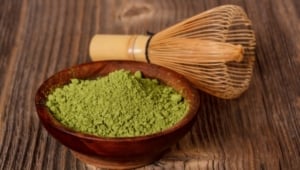Kombucha: 8 Health Benefits & 3 Possible Dangers

In Asia, the healing properties of kombucha have long been known. Kombucha has also become a popular refreshing drink in the United States. Learn more about the health benefits and possible dangers of kombucha and discover how it is made.
Kombucha is a very special type of tea. Unlike conventional teas, the beverage is not made from the leaves of a plant, but with the help of a fungus.
What Kombucha Is

What Kombucha Is
Kombucha is a fermented tea made with the kombucha fungus. The kombucha fungus, also known as tea fungus or Scoby (Symbiotic culture of bacteria and yeast), converts sugar into ethanol or carbon dioxide during the alcoholic fermentation of the drink.
This makes the drink slightly alcoholic. The levels vary between 0.5 and 2 percent.
The kombucha fungus is a mixture of various acetic acid bacteria and yeasts, and its consistency is reminiscent of gelatin. In tea, it forms on the surface of the beverage, where it thickens over time.
The color of the fungus depends on the tea and can range from pink to dark brown and light gray.
Origin of Kombucha

Origin of kombucha
The origin of kombucha tea is unfortunately not entirely clear. According to oral tradition, it probably comes from somewhere in East Asia, Japan or China.
There are several theories and legends about how the drink might have originated. Two of them are particularly well known.
According to one legend, Emperor Qin Shi Huangdi ordered the alchemist to brew a drink that would give him eternal life. He relied on the kombucha fungus as an immortality potion.
It is also widely believed that the name kombucha comes from a Japanese algae tea. In fact, "cha" means "tea" in Japanese.
"Kombu" (algae) + "Cha" (tea) = "Kombucha" (algae tea)
However, Japanese algae tea is something completely different. It is made from the alga Himanthalia elongata and has nothing to do with kombucha. Nevertheless, it is suspected that this is how kombucha tea got its name.
Regardless of how kombucha came to be and how it got its name, it’s hard to imagine a tea shelf without it these days.
How to Grow the Scoby Mushroom for Kombucha at Home

How to grow the scoby mushroom for kombucha at home
The kombucha "mushroom" (which is actually a fungus) used to make the tea beverage can be bought online or grown at home.
This is usually done with little effort. All you need to make a scoby is some un-flavored kombucha tea.
Pour it into a container with a large opening. Place a cotton cloth or coffee filter over the opening and tighten with a rubber band so that air can only enter the container through the cloth or filter.
Now let the tea rest for about two weeks.
After the first week, you should start to see the first yeast fungi forming, which will eventually grow into a large kombucha fungus. It should reach a certain thickness of about half an inch before you can remove it.
To ferment new kombucha, simply brew the desired amount of any tea, sweeten it, and add the scoby. After about two weeks, the kombucha should be ready to drink.
How to Make Your Own Kombucha Drink With Four Ingredients: A Recipe

How to make your own kombucha drink with four ingredients: A recipe
There are many ways to prepare kombucha tea. For example, some people prefer black tea to make kombucha, while others prefer green or herbal tea. Still others use fruit tea.
Even the amount of brewing fluid to add to the tea varies. We will enlighten you on the right way to make kombucha tea.
To make kombucha you need only four ingredients:
- Sugar
- Tea
- Scoby
- Starter liquid or Kombucha
First, mix about a liter of tea with four tablespoons of sugar. You can also mix the water with the sugar first and add the tea later.
Traditionally, black tea is used. But you can also use green tea, fruit tea, and herbal tea.
Allow the tea to cool to room temperature before adding 150 to 250 milliliters (5 to 8.5 ounces) of liquid. The liquid is simply the unflavored kombucha used to brew the scoby. Pour this liquid into the tea and add the scoby.
Cover the container with a cotton cloth or coffee filter and secure with a rubber band. The scoby must be able to breathe, so do not seal it airtight.
Place the scoby in a dark place. After a week you can check the development of the Kombucha. Fine threads of the fungus should have formed by now.
The fermentation time of Kombucha can vary. In winter it can take up to 14 days for the tea to turn into kombucha, while in summer it can be as little as a week.
Before drinking, it is recommended that you strain the kombucha so that it is a clear liquid and no parts of the scoby are left in the drink. The kombucha is ready to drink.
Preparation of Kombucha Tea – Possible Dangers and Tips
In order for the fermentation of kombucha to go smoothly, there are a few things to keep in mind. Although the preparation requires little effort, several factors can influence the result. We present these factors below.
Maintain Hygiene

Maintain hygiene
When brewing kombucha, it is important to maintain proper hygiene. The fermentation container should be clean and disinfected, as well as all other surfaces with which the scoby comes into contact.
Do not use conventional cleaning products, but rinse the container with boiling water.
In addition, it is important to wash your hands thoroughly before preparing the beverage to prevent bacteria from getting into the beverage.
If the bacteria and yeast of the kombucha fungus come into contact with other bacteria, it can significantly affect the quality of the kombucha or even cause mold. The health-promoting effects of kombucha will be lost, and consumption may even be harmful.
Do Not Use Metal
It is important to make sure that the scoby does not come into contact with metal during the preparation process. Metal can have a negative effect on the kombucha fungus and harm it.
That’s why you should use wooden or plastic utensils while stirring and straining. Also, the container in which you ferment your kombucha should not be made of metal. It is better to use a glass container.
Storage of Kombucha

Storage of kombucha
The storage of kombucha also has a significant impact on the quality of the drink. For example, temperature and space play an important role in the fermentation of kombucha.
Kombucha likes warm temperatures. The storage room should therefore have a temperature of around 23 degrees Celcius (74 degrees Fahrenheit).
Temperatures above this value will speed up the fermentation process. Cooler temperatures can slow down the fermentation process.
Overly warm temperatures, however, can damage the Kombucha, as the microorganisms can be thrown out of balance.
The storage location also plays a role in the fermentation of Kombucha. It should be kept away from harmful environmental influences such as smoke and steam.
In addition, it should be protected from insects by keeping a sufficient distance from any plants.
Food can sometimes encourage mold growth. So it is better to also keep the kombucha away from food.
Health Benefits of Drinking Kombucha Tea – Why It Is Good for You

Health benefits of drinking kombucha tea – why it is good for you
Kombucha has some active ingredients that can have a positive effect on human health. The content of kombucha varies depending on how it is prepared.
For example, the nutritional value of kombucha can be affected by the type of tea, the origin of the kombucha fungus, and the type of sugar used.
In general, there are many valuable ingredients found in kombucha. These include several strains of bacteria and yeast, important organic acids such as glucuronic acid, acetic acid, and lactic acid.
In addition, there are several vital enzymes, numerous minerals and trace elements such as zinc, iron and magnesium, and important vitamins.
This chapter will inform you about the health benefits of kombucha.
For a Healthy Intestinal Flora

For a healthy intestinal flora
Kombucha is best known for its positive effects on gut health. It contains important probiotics that support a healthy intestinal flora.
Since these are usually found in yogurt and other dairy products, the drink is especially interesting for vegans who avoid dairy and other animal products.
Kombucha can also have a mild laxative effect. This is mainly due to the acetic and lactic acids it contains. Similar to flaxseed and linseed, kombucha can support healthy digestion and contribute to a healthy lifestyle.
To Detoxify The Body

To detoxify the body
Kombucha is also said to support detoxification of the body. For example, the drink can be used to support a detox, in which toxins are transported out of the body.
In particular, the glucuronic acid contained in kombucha is said to support this process.
Scientists suspect that the acid can intervene in detoxification processes. It is used in the treatment of rheumatic diseases.
Among other things, kombucha can also be used to help people lose weight by ridding the body of excess pounds.
The beverage can reduce cravings and thus promote a healthy diet. However, the brew, with its ten calories per 100 milliliters (3.3 ounces), should not be consumed excessively. Water is a healthy, lower-calorie alternative.
To Boost The Immune System

To boost the immune system
Kombucha can strengthen the immune system. This, in turn, is due to its beneficial effects on intestinal health.
The gut plays an important role in the immune system. Among other things, intestinal bacteria are important for a healthy expression of the immune system.
A healthy intestinal flora with sufficient intestinal bacteria can strengthen the immune system, while an imbalanced intestinal flora can weaken the immune system.
Adequate dietary intake of probiotics is essential to establishing a healthy balance in the gut. Kombucha can be a good source of probiotics in this regard, along with yogurt and other dairy products.
In addition, kombucha is said to have a mild antibacterial effect. Again, this is due to the presence of acetic and lactic acid bacteria.
This effect can also support the immune system, especially if there is already a bacterial infection. Vitamin C can also have antioxidant effects in the body, protecting against free radicals that can damage cells.
These are produced by excessive UV radiation and similar harmful environmental influences.
Important B Vitamins

Important B Vitamins
Kombucha contains many vitamins. In addition to vitamins C, D, E, and K, the many B vitamins are especially noteworthy. The beverage contains vitamins B1, B2, B3, B6 and B12.
Since the body can only store a small amount of B vitamins, they must be obtained through a balanced diet. They play a crucial role in the body, especially in metabolic processes and energy production.
A deficiency of B vitamins can have significant effects on the skin, nervous system, heart and circulation, and many other organs.
Since B vitamins are primarily found in animal products, vegetarians and vegans can be deficient, but even people without dietary restrictions can suffer from a B vitamin deficiency. Kombucha can be a good source and support the daily intake of B vitamins.
Preventive for Arthritis
Kombucha can help to prevent arthritis. The body can convert the glucuronic acid it contains into glucosamine, which is used to treat moderate osteoarthritis of the knee, among other conditions.
Kombucha also provides important polysaccharides and glucoproteins that can provide optimal joint support.
For Cancer Prevention
Research has discovered that the glucaric acid found in kombucha may help reduce the risk of cancer. Among other things, the consumption of foods containing glucaric acid is thought to help reduce the risk of cancer.
Kombucha also contains the phytochemical polyphenol and vitamin C. These substances have an antioxidant effect and can protect against cell damage. In this way, the formation of cancer cells can be prevented and the risk of cancer can be reduced.
For More Energy
Kombucha is also said to provide more energy and have an uplifting effect. This is due to the caffeine content of the black tea traditionally used to make kombucha.
Kombucha also contains iron, which has a positive effect on energy levels. Similar to matcha and other green teas, the uplifting effect is consistent and long-lasting, unlike coffee, which has a quick but short-term effect.
Kombucha for Vegans

Kombucha for Vegans
For vegans, kombucha is an ideal refreshing beverage. It not only provides the body with important probiotics, but also important B vitamins, which are usually found in animal products.
Since vegans avoid animal foods such as milk, eggs, meat, fish, and all foods containing these ingredients, they must consume sufficient vitamins and minerals from plant sources.
Probiotics, in particular, can be difficult to absorb this way. Only a few plant-based foods, which are often difficult to incorporate into the daily diet, can provide probiotics.
These include kombucha, which, along with sauerkraut and apple cider vinegar, can be a good source of probiotics for vegans.
Possible Side Effects of Kombucha

Possible side effects of kombucha
Since the production of kombucha tea involves the use of bacteria, it can also pose some dangers. The unpasteurized tea contains a mixture of bacteria and yeast species. Therefore, it may cause infections.
For people with weakened immune systems due to diseases, drinking kombucha can lead to serious problems.
Even if you have a healthy immune system, consuming kombucha in excess can also be harmful to your health.
What is not obvious at first glance is that kombucha is high in calories. One bottle may contain up to 120 calories.
Drinking kombucha regularly can quickly lead to obesity, especially because calories in liquid are less filling and easier to consume in the long run.
Since kombucha is not exactly low in caffeine, too much kombucha can also lead to the well-known side effects of too much caffeine.
How to Buy Kombucha

How to buy kombucha
Kombucha is now available in some well-stocked supermarkets and drugstores. Here you can get both the regular kombucha tea as well as a spritzer with kombucha in it.
The Kombucha Scoby is mainly available online. There are several vendors that offer the fungus for sale. As far as prices go, they are usually between 7 and 15 Dollars.
Sometimes you can even find organic kombucha "mushrooms". These may cost a bit more than the standard price.
If you want to benefit from the health-promoting effects of kombucha, it is best to brew the tea drink yourself. Industrially produced kombucha may contain fewer microorganisms. You will find out why in the last chapter.
Why You Should Buy Raw Instead of Pasteurized Kombucha

Why you should buy raw instead of pasteurized kombucha
Most kombucha tea is sold unpasteurized and raw.
However, you can sometimes find pasteurized kombucha in the supermarket or your local grocery store.
This type of kombucha has been heated to such a high temperature that all the bacteria have been killed.
After that, the manufacturers often replace the natural bacteria with their own probiotics. Often the reason for this is so that the tea can be sold as non-alcoholic.
If you buy raw kombucha, you can be sure that it has not been pasteurized. It contains all the naturally occurring bacteria.
Added probiotics do not provide as many health benefits as the naturally occurring ones, and they are not as diverse as the ones found in raw kombucha. This is the reason why raw kombucha is so much healthier.
Preserving the beneficial bacteria in the drink is crucial because kombucha is, after all, a fermented tea.
However, if you are pregnant, you should stay away from raw kombucha, and opt for the pasteurized version.





